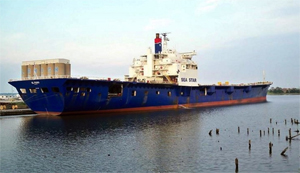
In the wake of the El Faro disaster, a federal review of a U.S. Coast Guard initiative to ensure that domestic vessels meet safety management system (SMS) standards found that it is too early to evaluate the effectiveness of these efforts.
The report by the Government Accountability Office (GAO) noted that actions taken by the Coast Guard since the tragedy have enhanced the service’s oversight of recognized organizations (ROs). These are third-party companies that the Coast Guard allows to review an operator’s SMS, issue applicable vessel certificates, and perform audits of safety plans aboard each vessel.
The Coast Guard’s steps to improve oversight of SMS stem from the incident on Oct. 1, 2015, in which the cargo ship El Faro sailed into the heart of Hurricane Joaquin and sank, killing all 33 mariners aboard. Investigators found deficiencies in El Faro’s SMS plan, a factor that may have contributed to the sinking. Some in Congress questioned how effective SMS plans are, the ability of the Coast Guard to oversee the third parties conducting SMS audits, and whether the SMS plans meet federal and international standards.
Since the sinking of El Faro, the Coast Guard has taken several steps to improve its oversight of recognized organizations and SMS plans. These actions included creating a new Coast Guard group to monitor ROs; developing new SMS guidance and work instructions; increasing direct observation of organizations performing SMS audits; coming up with key performance standards for evaluating ROs; and requesting internal investigations for certain RO deficiencies.
In April 2018, the Coast Guard established guidelines for 21 specific shipboard emergency scenarios and how to address them. However, these guidelines are not a substitute for legal requirements, nor are they Coast Guard regulations, according to the GAO report.
Officials from two ROs said that their auditors “may be limited to issuing an ‘observation’ to the vessel operator if any potential shipboard emergency listed in Coast Guard guidance is not addressed in SMS plan documents,” according to the GAO report. The International Safety Management Code states that an “observation” is not as binding as an SMS “nonconformity,” which would require specific action to correct.
However, the GAO noted that the 21 shipboard emergencies do not apply to every vessel or in all operating regions, and that more time may be needed for companies to add these contingencies to their SMS plans.
If a specific risk “is not applicable to the company’s operations, the company should be prepared to discuss or provide documentation that outlines the reasons for not addressing (it) in their safety management system,” said Coast Guard Chief Warrant Officer Kurt Fredrickson.
The Coast Guard has asked ROs to review the 21 emergency procedures and how companies are evaluating risk. “The Coast Guard will evaluate the findings to see what gaps may exist and find the best way to apply new interventions as necessary,” Fredrickson said.
For its review, the GAO audited 25 vessels in five categories: general cargo/container; chemical/oil carrier; offshore supply/support; towing/tugboats; and passenger ferries. The agency received 11 SMS plans from the American Bureau of Shipping (ABS) representing 18 vessels, and another plan from DNV GL. From June 2019 to April 2020, the GAO evaluated the plans, attended SMS audits, and conducted interviews with Coast Guard, recognized organizations and operators’ personnel.
Each of the 12 SMS plans reviewed by the GAO identified potential shipboard emergencies and response procedures, but they did not address all 21 emergency scenarios included in the Coast Guard’s 2018 guidance. In the 12 plans, the number of unique shipboard emergencies addressed ranged from five to 16. Ship routing procedures regarding heavy-weather emergencies — the scenario in the El Faro sinking — were only addressed in five of the 12 SMS plans, with one other plan referencing separate heavy-weather guidance.
The Coast Guard does not believe the GAO will conduct an additional review of SMS plans and emergency preparedness.
